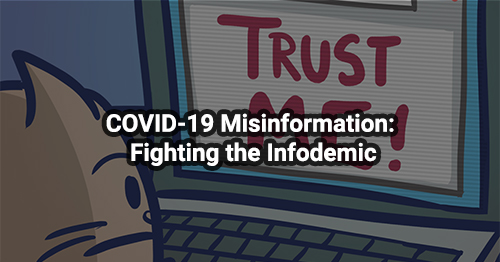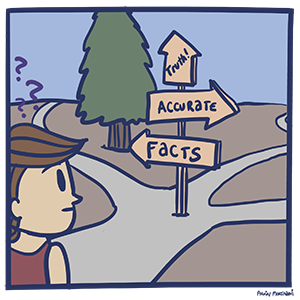COVID-19 Misinformation: Fighting the Infodemic

There are two COVID-19 battles going on right now. One is to fight the virus itself by keeping people safe, stopping its spread, and finding cures and vaccines.
The other battle is fighting misinformation about COVID-19. With the right information, we can protect ourselves, our families, and the entire world. With the wrong information, we can harm the people we care about and make it harder to stop the virus.
No wonder World Health Organization Director-General Tedros Adhanom Ghebreyesus said, “We’re not just fighting an epidemic; we’re fighting an infodemic.”
We need to win both fights. Unfortunately, signs indicate that we are losing the battle against COVID-19 misinformation.
Current State of the Battle Against COVID-19 Misinformation

How serious is the spread of misinformation? At least two countries—the USA and UK—have set up specialist units to combat misinformation about COVID-19. Facebook, Twitter, Youtube, Google, and Pinterest have taken steps to minimize the misinformation. The World Health Organization (WHO) started a TikTok account just to fight it.
Yet despite all these efforts, misinformation is spreading across all platforms. Facebook users have found ways to bypass anti-misinformation measures. Traditional media outlets have accidentally shared false information about COVID-19. Even some heads of state have said things that contradict the WHO and the Centers of Disease Control (CDC).
In addition, the situation with COVID-19 is changing every day. This means that what was accurate yesterday doesn’t necessarily mean it’s accurate today.
In short, misinformation is everywhere, and it’s a lot harder to avoid than you might think. Ultimately, it’s on each of us to make sure we are getting accurate information.
Who Benefits from Misinformation?
- Hackers. Scams have emerged that promise accurate information, only to install malicious software for political or economic gain.
- Political enemies. The USA and the European Union have claimed that they have detected a coordinated effort by the Russian government to spread misinformation about COVID-19.
- Scammers. Whether they are selling a “miracle cure” or secret insider information, a lot of people are trying to convince us that they are more trustworthy than the CDC or the WHO. In the end, they are trying to sell you membership, a product, or a conspiracy theory tied to a different issue (such as anti-vaccine ideas).
The solution: Treat ALL Coronavirus/COVID-19 information as if it’s in your email spam folder.

While the obvious solution is to get our information from trusted sources such as the CDC, the WHO, and the BCCDC, it doesn’t help that traditional news outlets are also getting it wrong. So what is the solution?
Treat ALL Coronavirus/COVID-19 information as if it’s in your email spam folder. Even information supposedly from the CDC.
Think about how you treat emails in your spam. Sometimes they are legitimate emails from real companies or organizations you trust. Sometimes, it’s from a supposedly wealthy prince trying to give you a million dollars, and it’s clearly not trustworthy.
When it’s supposedly someone you trust:
Even if you think you know who sent you the email, if it’s in your spam folder you should not open it or click on the links. This is because it might be from a scammer or a hacker who is faking an email. Often, you’ll see something scary such as “your account is being cancelled” in the subject line. They are trying to trick you into clicking on the link. Instead, you should always go directly to the company’s website and look for the information there. If it’s on their website too, you know it’s true.
The same thing applies with COVID-19 information. Even if an article, website, video or person says the information is directly from the WHO, try to google it yourself. See if the WHO (or CDC, BCCDC, or other trusted sources) also says it on their site. Otherwise, it’s a good bet it’s made up or misquoted.
You also want to check the publication date of any information you are reading. Since information about COVID-19 changes frequently, make sure it is recent information. Some facts change daily (such as the number of people infected), while others might take a little longer to change (such as facts about treatment, where to go, what to do).
When it’s clearly not trustworthy:
If an email is in your spam folder and it’s clearly a scam, you should not open the email at all (let alone click on any links in it). Just delete it and forget about it.
The same thing can be said for COVID-19 information. If it’s clearly misinformation, don’t open, engage, or read it. Opening and clicking on these articles might seem harmless, but doing so actually helps misinformation spread (for example, clicks will make Facebook’s algorithm think it’s worth showing to more people). Deliberate misinformation exists because people click on those links—even if you don’t believe it, the site might get ad revenue, your data, or even make you download a computer virus. It’s just not worth it.
Researchers, public health workers, doctors, nurses, and other specialists are working hard to combat the COVID-19 virus. While it’s hard to contribute to that directly, we can all fight the battle against misinformation.
Remember, treat all the COVID-19 information like it ended up in your spam folder.
What about Kids Boost Immunity as a trustworthy source of information?

Kids Boost Immunity is a trustworthy source. KBI is a Canadian health initiative made possible through a partnership between public health agencies in Canada, including the BC Ministry of Health, the Public Health Agency of Canada, and the BC Centre for Disease Control.
That being said, information about COVID-19 changes too fast even for KBI! This is why KBI is not posting some specific information about COVID-19 such as the numbers of cases, countries, or even the nature of the virus. For the most up-to-date information about COVID-19, you should go to the WHO, the CDC, the BCCDC, or other trusted public health organizations.
For more information about how to be a critical thinker, check out the lessons in the Critical Thinking & Evaluating Information section.
All lessons & quizzes are free!
This was just one of the lessons in our Global Inequality section. There are over 60 lessons on Kids Boost Immunity just like this one on a variety of subjects. Each lesson includes a quiz, and every time a student scores 80% or higher on a quiz, we will donate life-saving vaccines to UNICEF Canada. Sign up now!



